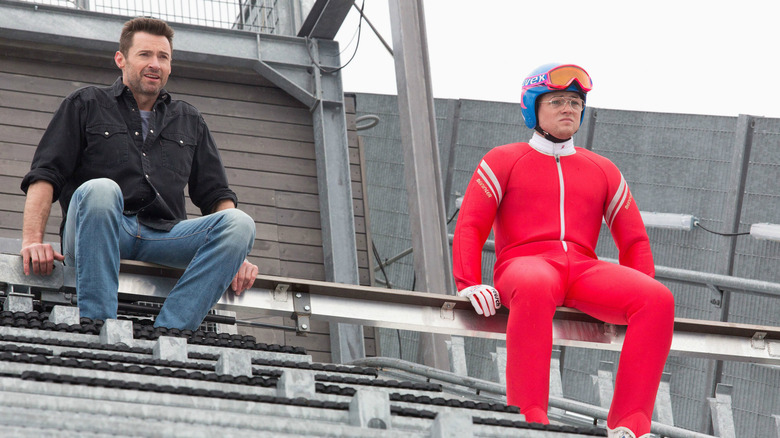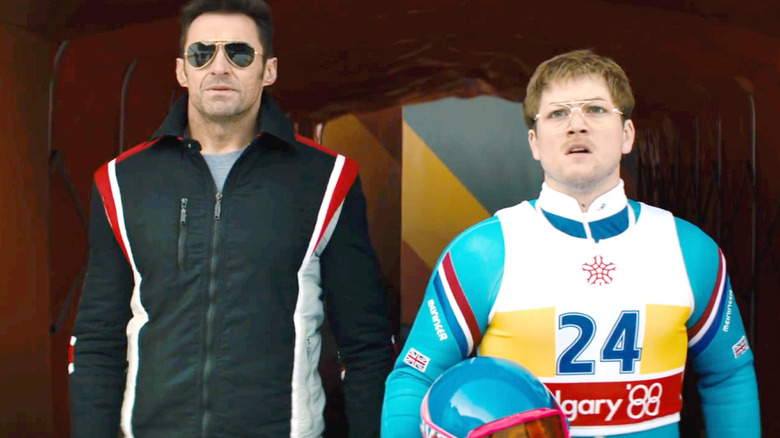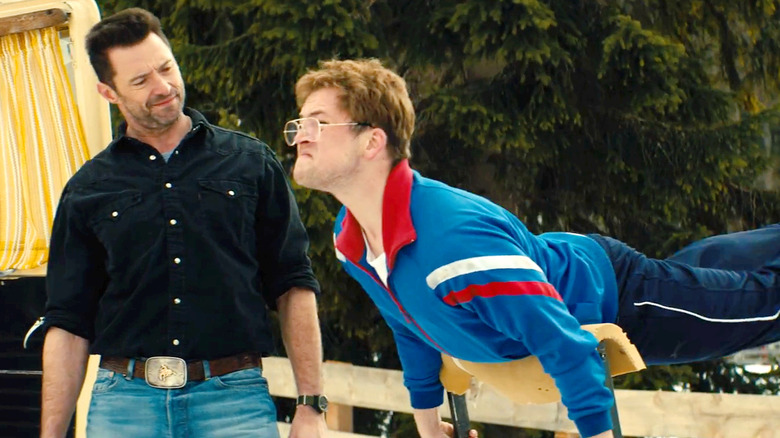One Of Hugh Jackman's Best Roles Was A Fictional Addition To A True Story
Dexter Fletcher's 2016 sports biography "Eddie the Eagle" tells the true story of Michael Edwards, the first ski jumper to represent England in that sport at the Winter Olympics. He competed in the 1988 Winter Games in Calgary, skiing in both the normal hill and the large hill events.
If one learns of Edwards' story, however, one can see how it would make for an interesting film. Edwards wasn't terribly talented as a ski jumper, as he weighed much more than the average skier, and had to wear thick glasses while competing. Because of lax rules in the Olympic qualification rules, however, Edwards was able to secure a spot on the British Olympic team after finishing 55th at the 1987 ski jumping world championships. He had no other British competitors, so he was allowed to compete. Edwards came in dead last in both of his events.
In "Eddie the Eagle," Edwards was played by Taron Edgerton, presented as a kooky but lovable outsider who dreamt of Olympic glory, but who was never good at much. Eddie, however, does spot the loophole in the Olympic code and decides to impishly infiltrate ski jumping. In the film, Eddie sets off on his own to train in Germany where he catches the attention of Bronson Peary (Hugh Jackman), an American alcoholic burnout who works at the ski jump facility. The two men bond over their mutual dreams, with Eddie loving that his glory lies ahead, and Bronson lamenting that his triumphs are all in the past.
Here's the real kicker, though: Bronson Peary isn't a real person. While the film does depict certain details of Edwards' Olympic career, the film is wholly inaccurate to life. It's the Hollywood version of Edwards' story, complete with a whole new character on which the filmmakers could hang ancillary drama.
In a 2016 interview with PopSugar, director Fletcher explained his reasoning behind the extreme fictionalization of Edwards' story, and why he felt Bronson Peary was a necessary addition.
Hugh Jackman's character was entirely fictional
Know that, in screenwriting terms, the Bronson Peary character was a vital addition. He provided Eddie with someone he could talk to, as well as someone to challenge him. Indeed, the central confrontation in the film comes when Bronson accuses Eddie of not taking the sport of ski jumping seriously. Bronson says he's just a tourist with an eye for loopholes. Eddie continues to compete to prove that he is a real athlete. That's a good arc, as movie drama dictates.
But it was all fictional. When Fletcher was asked, point-blank, why he needed an additional fictional character inserted into the life of a real-life human, he explained it clearly, in writer's terms. "You've got to have a human relationship at the heart of a film like this," he said, "because that's what people connect to and understand." He said that someone needed to push Eddie through any doubts and adversity and, in his mind, that job was relegated to an imaginary player.
He also argued that Eddie required a counterbalance, so he could have his career constantly being put into perspective. He continued:
"It's about Eddie and his journey, but it's also important that there's some sort of attempt to explain who Eddie is, what he's going through, why he's feeling the things that he is, and also have a character who's pushing back against him in order for the audience to feel like they're part of that journey as well. So initially that's the core; that's the heart of that reason."
Also, and perhaps most importantly, Fletcher was stoked to learn that Hugh Jackman was interested in his film. He took pen to paper right away to accommodate whatever the actor might need. "Hugh Jackman wanted to be in it!" he said. "What was I going to say? 'Quick, I better write something!'"
What Michael Edwards thought
Dramatically and practically, it all makes sense. Also, Hugh Jackman is very game in the role, turning a rather clichéd movie-ready character into someone with a little bit of heart. Also, his presence made the relatively small film (it had a $23 million budget) a modest success (it grossed $46 million).
Before the release of "Eddie the Eagle," the Guardian contacted the real Michael Edwards to get his opinion on the matter. Edwards, as it turns out, wasn't very heavily involved in the filmmaking process, and wasn't closely contacted by the film's screenwriters Sean Macaulay and Simon Kelton. Indeed, he was told directly that the film was only 10 to 15% accurate. Edwards was so out of the loop that he became anxious about his portrayal. He said:
"I've not really seen the script so I don't know what they've picked out of the things that happened in my life and what is made up. There's always a certain amount of [poetic lisence] but I'm kind of anxious; what exactly have they put in about my life and how have they portrayed me?"
Edwards needn't have worried about his own story, as Edgerton gave a sensitive portrayal of a man who lives out his own Olympic dreams and who overcomes his cynicism. The fact that Hugh Jackman, a charming movie star, appeared in the film as a fictional coach didn't seem to bother him. It seems Edwards was just as excited to have Jackman on board as Fletcher.


